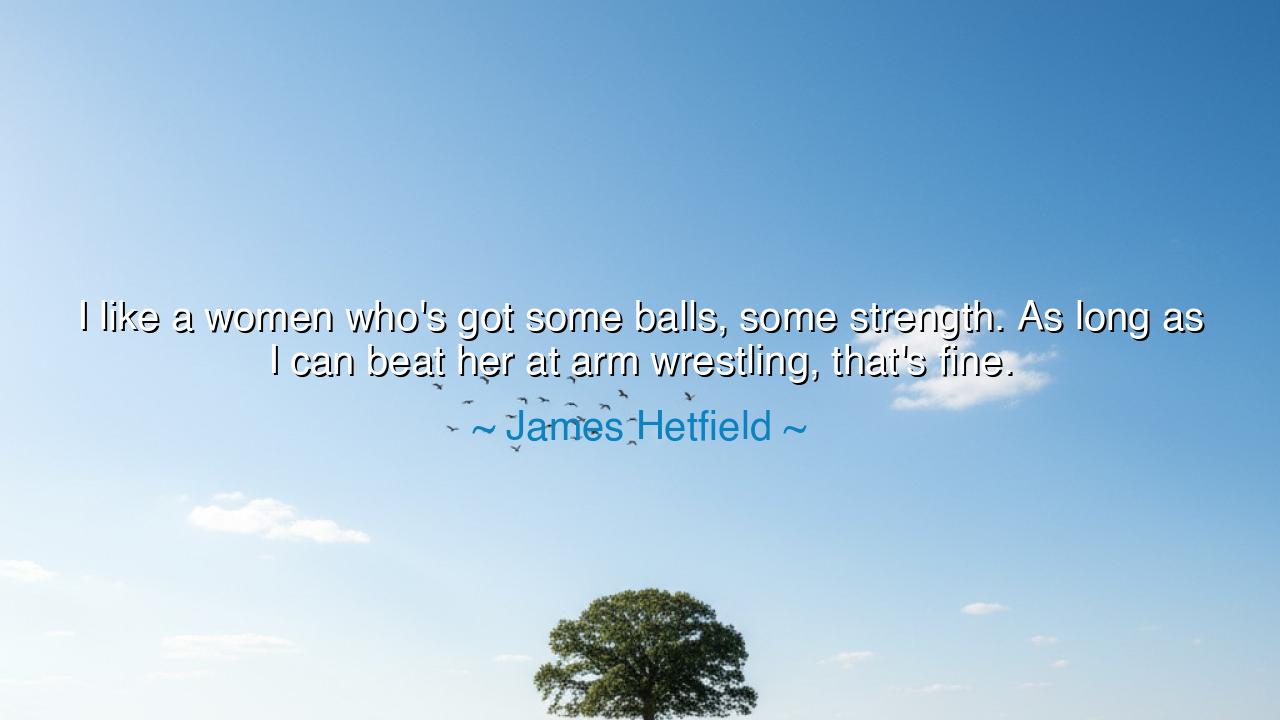
I like a women who's got some balls, some strength. As long as I
I like a women who's got some balls, some strength. As long as I can beat her at arm wrestling, that's fine.






Hear the voice of James Hetfield, the frontman of fire and thunder, who once declared with raw humor and deeper truth: “I like a woman who’s got some balls, some strength. As long as I can beat her at arm wrestling, that’s fine.” Though his words are clad in jest, they reveal a wisdom both ancient and enduring: the admiration of strength in women, balanced with the human need for play, rivalry, and affection. Behind the laughter lies a recognition of courage, resilience, and vitality—qualities that elevate companionship beyond the shallow and into the heroic.
When Hetfield speaks of a woman with “some balls, some strength,” he honors a truth often obscured by tradition—that true beauty and worth do not lie in fragility alone, but in resilience of spirit. To admire a partner’s strength is to see her not as an ornament but as a warrior, a companion in the battles of life. It is to respect her as one who can stand firm when storms rise, who does not collapse under burden, but who endures, inspires, and uplifts.
Yet his jest about arm wrestling reminds us of another ancient truth: that strength in love is not about domination, but about balance. Relationships thrive not when one crushes the other, but when both bring vitality, courage, and resilience to the table. To wrestle in play is to honor each other’s force; to concede with laughter is to build unity rather than enmity. His words carry the spirit of camaraderie, where the contest of strength is not meant to divide, but to bond.
History offers us images of such balance. Think of Queen Isabella of Spain and King Ferdinand, whose partnership united kingdoms and changed the course of history. Isabella’s strength of will, her courage in faith and governance, made her not merely the queen beside the king, but a ruler in her own right. Ferdinand admired and respected her power, and though their story is clouded by shadows, it shows the truth that Hetfield hints at: great unions are forged not from weakness, but from strength that stands side by side.
The deeper meaning of this quote is that men who truly respect women are not threatened by their strength, but drawn to it. Weakness breeds resentment and fragility; strength breeds admiration and lasting respect. Hetfield’s jest suggests that men and women alike find joy not in imbalance, but in playful tension—where strength meets strength, where respect meets resilience, and where both partners can challenge and inspire each other to grow.
The lesson for us, O listener, is this: do not fear strength in others, but embrace it. Whether in love, in friendship, or in community, seek those whose courage and resilience sharpen your own. And if you find strength in yourself, do not hide it, for your resilience is not a burden but a gift to those around you. The dance of life is not made beautiful by weakness, but by the interplay of equal spirits who are unafraid to test and uplift one another.
Practical steps are these: honor the strength of those you love, whether it shows in courage, patience, resilience, or determination. Do not measure relationships by domination, but by partnership. Allow play, humor, and even rivalry to deepen bonds rather than weaken them. And above all, seek companions who challenge you, for it is through challenge that admiration grows and through respect that love endures.
Thus Hetfield’s words, wrapped in humor, ring with wisdom: “I like a woman with strength.” Let this truth echo in all hearts: that love is not the possession of the weak by the strong, but the union of two resilient souls, who wrestle, laugh, endure, and triumph together. For where there is strength and respect, there too will be joy, and the victories of life will be shared by both.






AAdministratorAdministrator
Welcome, honored guests. Please leave a comment, we will respond soon